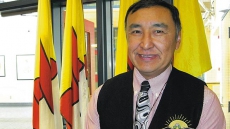OTTAWA — The Trudeau government's maiden budget will make it easier for jobless Canadians to collect employment insurance benefits and will target some additional EI measures at workers in energy-producing provinces hit hard by the plunge in oil prices.
But it won't immediately deliver on some other Liberal election promises to reform the EI system, including promised improvements to parental and compassionate care benefits.
And it is expected to defer until the fall a promised 12-month EI premium holiday for employers who give permanent jobs to young Canadians, aged 18-24.
Those are just three election promises that are expected to be put off in Tuesday's budget as Prime Minister Justin Trudeau's fledgling government struggles to come to grips with an oil-price plunge that has sapped federal revenues and slowed already sluggish economic growth to a crawl.
Government insiders, speaking on condition of anonymity because they were discussing matters not yet made public, said there would be few surprises in the budget, which will instead stick to the promised "approach" of investing in infrastructure, long-term economic growth and middle-class Canadians.
That means it will include two big-ticket items from the Liberal platform: an enhanced, tax-free, income-tested child benefit and at least $5 billion in new infrastructure investments.

The government has already acted on another big ticket promise: reducing the tax rate on income between $45,282 and $90,563 while imposing a new higher tax rate on income over $200,000.
As Trudeau put it Monday in the Commons: "We put forward a plan that focused on investing in our communities, helping the middle class and creating growth in a way that would help all Canadians.
"That is exactly what we campaigned on. That is exactly what we are going to be delivering in (Tuesday's) budget."
But sticking to the platform's general approach and honouring all the more than 200 election promises Trudeau made are two different things.
Indeed, even before adding new spending in the budget, the government has already broken one pivotal campaign promise: the vow to keep budget deficits to less than $10 billion for the each first three years of the Liberal mandate. Finance Minister Bill Morneau revealed last month the 2016-17 deficit was en route to $18.4 billion.
Once the budget's new investments are tallied up, the deficit is expected to balloon to about $30 billion — three times more than promised. But that includes a hefty contingency cushion of $6 billion, which could ultimately soften the blow.
Morneau has also telegraphed well in advance that he's likely going to renege on two other promises that anchored the Liberals' fiscal agenda: ensuring the debt to GDP ratio declines each and every year and balancing the budget in the fourth year. The worsening economic picture has made both those goals much harder to achieve.

Ivey School of Business economist Mike Moffatt, who was a member of Trudeau's economic advisory council before the election and helped cost the Liberal platform, will be taking the platform with him into the budget lockup to check on what else has changed or gone missing.
"I think it might be more interesting to see what they don't do, in the sense of what was in their platform that they had to back off of, for one reason or another," he said in an interview.
Insiders suggest the many campaign promises on improving the lot of veterans will be spread out over the four-year mandate.
Some of the pricey promises aimed at improving the quality of life for indigenous peoples — included a sweeping, uncosted promise to deliver on all 94 recommendations of the Truth and Reconciliation Commission — may not materialize immediately either, although Trudeau said Monday that the budget "will feature historic investments in First Nations and indigenous Canadians right across the country."
On EI, the Liberal platform promised to make compassionate care and parental benefits more flexible and more inclusive. But it has since been determined that the changes are too complex to be made quickly in the first year of the Liberal mandate.
The budget is expected to deliver on the Liberals' promises to reduce the wait time to collect EI benefits to one week from two, starting in 2017, and to reverse a measure imposed by the previous Conservative government that requires the unemployed to take lower-paying jobs outside their communities.
It's also expected to deliver on platform promises to pump $500 million per year more into labour market development agreements with the provinces and up to $775 million for jobs and skills training.
The Liberal platform also promised to reduce employers' EI premiums, starting in 2017, from $1.88 per $100 earned to $1.65. However, Employment Minister MaryAnn Mihychuk has since hedged on the precise size of the premium cut.
She has also signalled that not all the EI promises can be fulfilled immediately, that overhauling the system is a complex business that will take some time.

Trudeau told the Commons on Monday that the budget will deliver on "concrete (platform) commitments to improve access to Employment Insurance for the people of Canada, including in areas where the oil-price decline has led to difficulties."
Insiders say the budget will make it easier for all unemployed Canadians to access EI but it will also have measures targeted at supporting workers in regions hard hit by the oil price shock, particularly Alberta. The duration of benefits, for instance, could be increased in economically depressed regions.
It could also allow the jobless in those regions to accept low-wage jobs without having their EI benefits clawed back.
University of British Columbia economist Kevin Milligan, who also sat on Trudeau's economic advisory council, said he won't be surprised if there are some adjustments to the promised infrastructure investments to take into account economic need in Alberta, Newfoundland and Labrador and Saskatchewan.
For instance, he said Morneau might create a "fast lane" for energy producing provinces, speeding up their share of the promised 10-year roll-out of $60 billion in additional infrastructure investments.

Both Milligan and Moffatt also think the government might give a nod towards creation of a guaranteed minimum income, agreeing to take part in a pilot project already announced by Ontario. Such an initiative wouldn't cost much and wouldn't commit the government to actually ever implementing the poverty-alleviating scheme across the country.
AS BUDGET DAY ARRIVES, A LOOK AT OUTSTANDING LIBERAL CAMPAIGN PROMISES
OTTAWA — The federal budget is again focusing attention on whether the Liberals will make good on some unfulfilled campaign spending promises. So far, they've delivered on one major commitment: Starting Jan. 1, the income-tax rate dropped to 20.5 per cent, from 22 per cent for taxable earnings between $45,282 and $90,563.
Here are some others that could be in play:
TAXATION
— Changing the rules to allow people to dip into their RRSPs more than once to buy a home.
— Bringing in a new, tax-free child benefit to replace the Conservative universal child benefit.
— Providing a refundable tax benefit of up to $150 for teachers who spend their own money on school supplies.

INFRASTRUCTURE
— Steps to increase federal infrastructure investment to almost $125 billion, from the current $65 billion, over the next
decade.
— Provide $1.5 billion for public transit in Calgary as well as unspecified financing for flood control measures in the city.
— Help fund a Montreal rapid transit expansion, as well as a light-rail project on the Champlain Bridge linking Montreal to the suburban South Shore.

HEALTH CARE
— Spend $3 billion over four years on home care and improve access to and reduce the cost of prescription medications through bulk purchasing.
— Establish a pan-Canadian expert advisory council on mental health.
SOCIAL POLICY
— Spend $40 million over four years on the Nutrition North program, which is designed to help defray the high cost of nutritious food in the North. Increase the northern residents deduction by 33 per cent to a maximum of $22 a day.
DEFENCE
— Scrap the purchase of the F-35 fighter jet and instead buy cheaper planes. Spend the savings on navy vessels.
— Spend $300 million a year to reform veterans' benefits and delivery of services to vets.

JOBS
— Put up $200 million a year for three years to help research facilities, small business incubators and exporters and invest another $100 million a year for an industrial research assistance program.
— Give $500 million to the provinces for skilled trades training, and devote $200 million for federal training programs. Set aside another $50 million to help aboriginal people improve their skills and job prospects.
— Spend about $1.5 billion over four years on a youth job strategy to help 125,000 young people find a job.
— Reduce EI premiums to $1.65 per $100 earned from $1.88. That's less than the $1.49 rate that the Tories committed to in the 2015 budget, but the extra money would be reinvested, with $500 million going to the provinces for skills training.
ENVIRONMENT
— Reinstate $40 million cut from the ocean science and monitoring program at the Department of Fisheries and Oceans.
ABORIGINALS
— Add $515 million a year to funding for First Nations education, rising through the mandate to a total of $2.6 billion. Add another $500 million over three years for education infrastructure and $50 million more a year for a program that helps aboriginals in post-secondary education.
CULTURE
— Provide $380 million in additional funding for the arts and undo Conservative funding cuts to the CBC.




